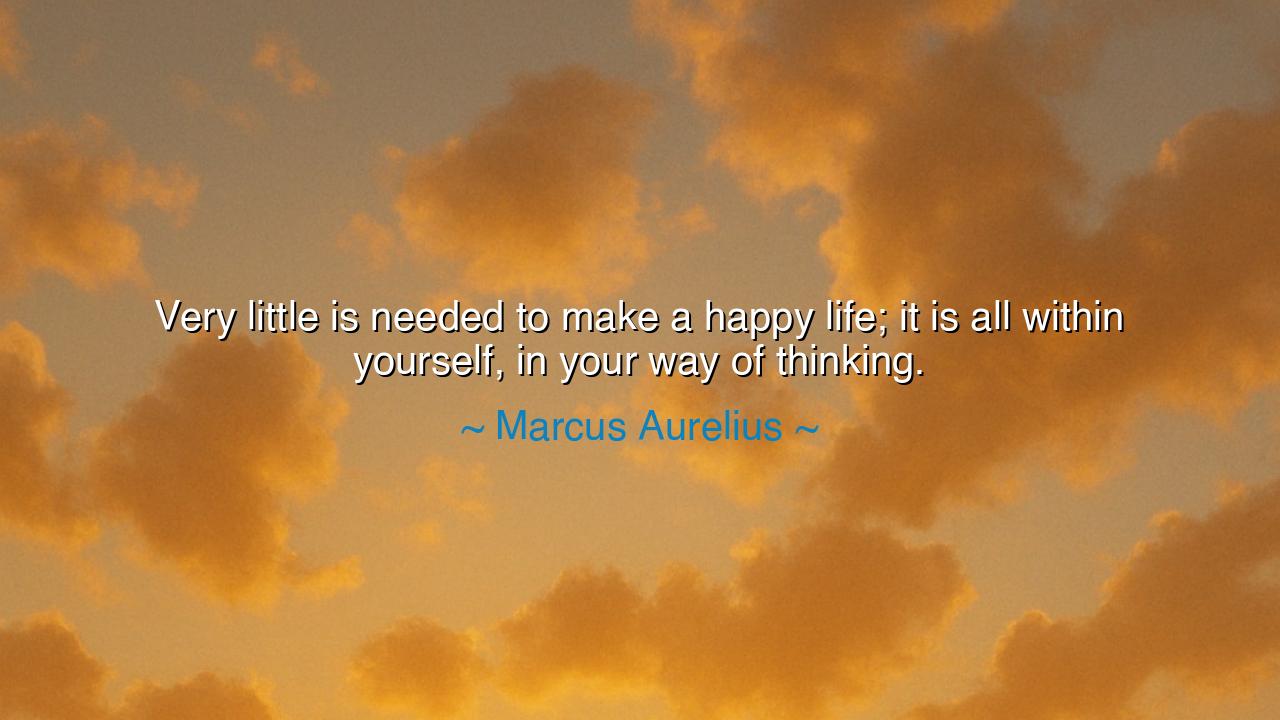
Very little is needed to make a happy life; it is all within
Very little is needed to make a happy life; it is all within yourself, in your way of thinking.






“Very little is needed to make a happy life; it is all within yourself, in your way of thinking.” Thus wrote Marcus Aurelius, philosopher and emperor, ruler of men and yet servant of wisdom. These words come from his Meditations, a book not written for others but whispered to himself in the quiet hours of reflection, when the crown was heavy and the world weighed upon his heart. He was a man surrounded by war, duty, and loss, yet he found peace not in luxury or conquest, but in the stillness of the mind. In this single sentence, he distilled the essence of Stoic philosophy—that happiness does not depend upon the world outside, but upon the world within.
To understand this truth, one must first understand the man who spoke it. Marcus Aurelius was not born into ease. Though he sat upon Rome’s throne, his reign was filled with strife, betrayal, and plague. Armies rebelled, friends deceived him, and the empire trembled. Yet through it all, he wrote with serenity: “The happiness of your life depends upon the quality of your thoughts.” He knew that fortune is a fickle ally, that kingdoms crumble and pleasures fade, but the mind—if disciplined and pure—remains unconquered. The Stoics taught that the key to peace is not in controlling what happens, but in controlling how one responds. The wise man, they said, carries his contentment wherever he goes, as the turtle carries its home upon its back.
Happiness, then, is not a gift granted by fate, but a craft shaped by the soul. It does not arise from wealth or power, for these are only shadows that pass with time. Nor does it live in the approval of others, for their praise is as fleeting as their memory. It is found instead in the mastery of one’s own thoughts, in the ability to see clearly and act rightly despite chaos. Marcus Aurelius believed that the universe is governed by reason, and that man, as part of that divine order, must seek harmony with it. When the mind is aligned with nature—when one accepts what is and does what is just—then even sorrow can become serenity. The way of thinking, not the world, determines the quality of life.
History offers many examples of this truth. Consider Epictetus, the Stoic slave who was beaten and broken by his master, yet spoke of freedom. He said, “No man is free who is not master of himself.” Though chained in body, his mind soared beyond reach, and his calm wisdom influenced emperors and generations of philosophers. Or think of Viktor Frankl, a man centuries later, who endured the horrors of the Nazi camps. Stripped of everything—family, possessions, dignity—he discovered that one thing could never be taken: the power to choose his attitude. “Everything can be taken from a man,” he wrote, “but one thing: the last of the human freedoms—to choose one’s own way.” These men, like Marcus, knew that true happiness is an act of the will, not a condition of circumstance.
Marcus Aurelius also reminds us that the essentials of life are few. He speaks not only of thought but of simplicity. To live well, one needs little—just as the wise tree grows strong with only sunlight, water, and earth. We weigh ourselves down with possessions, ambitions, and desires, and then wonder why we are weary. Yet joy lies in simplicity, in gratitude for what already is. The man who can find wonder in the morning air, in a kind word, in the rhythm of his own breath, possesses a wealth no emperor can match. As Marcus wrote, “Look well into yourself; there is a source of strength which will always spring up if you will always look.”
And yet, this path is not easy. The mind is a restless beast, ever chasing shadows, ever seeking more. The discipline of contentment is an art forged through practice. Marcus trained his mind as soldiers train their bodies—daily, deliberately, with courage and patience. He confronted his own anger, fear, and vanity, reminding himself that these were but illusions. “You have power over your mind,” he wrote, “not outside events. Realize this, and you will find strength.” To think rightly, one must first learn to see rightly—to strip away distortion and behold life as it truly is: fleeting, precious, and sacred.
So, my child of the present age, take this wisdom as your inheritance: happiness is not found, it is created. It is not a treasure buried in the world, but a light that shines when the heart is calm and the mind is clear. Begin each day by asking yourself, “What depends on me, and what does not?” Cultivate gratitude for the little things, guard your thoughts as you would guard your home, and act always with justice and compassion. Do not chase joy—it will elude you. Become worthy of it, and it will dwell within you.
For Marcus Aurelius spoke not as a god, but as a man who had mastered himself. His message is eternal: very little is needed to make a happy life—a quiet mind, a noble heart, and the courage to see that all peace begins from within. When you understand this, no storm can shake you, no loss can destroy you, and no world can rob you of your happiness. You will have found the kingdom that kings themselves could not command—the empire of the soul.






AAdministratorAdministrator
Welcome, honored guests. Please leave a comment, we will respond soon